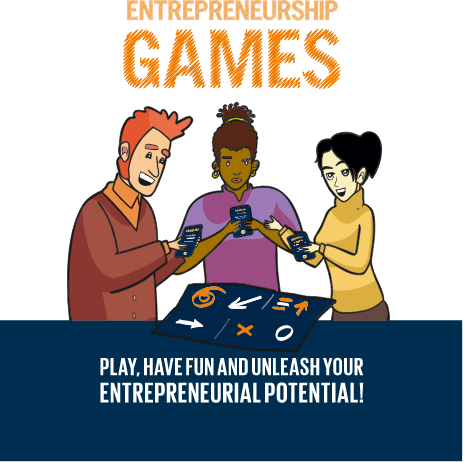
ENTREPRENEURSHIP GAMES
A 50 games card deck to teach entrepreneurship through play. Trainers and educators use this experiential tool to unleash the entrepreneurship skills within everyone. You don’t need to be an entrepreneur to be entrepreneurial.
LEARN THROUGH PLAY
Entrepreneurship can be complex to teach.
People perceive it as a start-up oriented topic exclusively for born entrepreneurs and approach it with bias. Games help us break them and make learning more effective: whether you are a child or an adult, playfulness is essential for developing social and cognitive skills.
We designed 50 games tackling real-life challenges, such as decision making in business, work and life, so that you can teach entrepreneurship through play.
MAKE LEARNING EFFECTIVE
Make your training session more engaging, increase team cooperation and boost creative thinking.

1. Get ready
Follow the instruction to prepare the material and the group needed to play.

2. Play
Trigger learners to test and practice their entrepreneurship skills in a safe learning environment where they experience failure and success.

3. Debrief
Maximize learning outcomes by guiding learners in reflecting upon Games’ dynamics and conceptualizing key takeaways. Through play, learners become better prepared to apply an entrepreneurial approach in their life.
THE THEORY BEHIND IT
The Games learning experience is based on Kolb’s Experiential Learning Cycle. The model consists of four connected steps:
- EXPERIENCE. Experience matters: without it, there can be no true learning. In a “concrete experience”, the participant performs an activity, such as playing a game.
- REFLECT. Experiences may be un-educative if learners are not given time to reflect upon them. Trainers must stimulate such reflections upon experiences to make them meaningful. After playing a game, participants share their reflections about it.
- CONCEPTUALIZE. Participants process the experience through discussion and analysis to identify key learning outcomes.
- APPLY. Prompted by the trainer, participants consider how learning outcomes and entrepreneurship skills can help them in real life.




